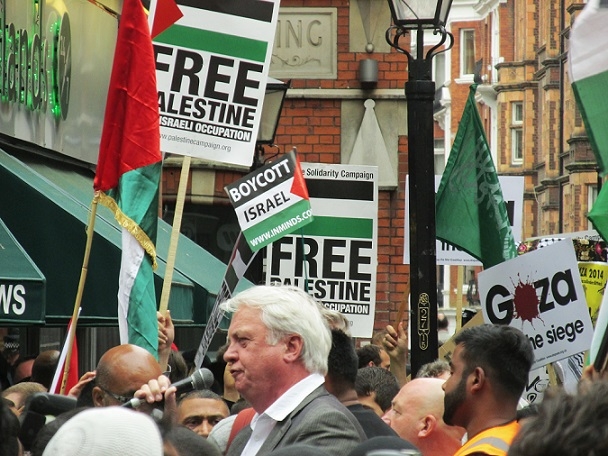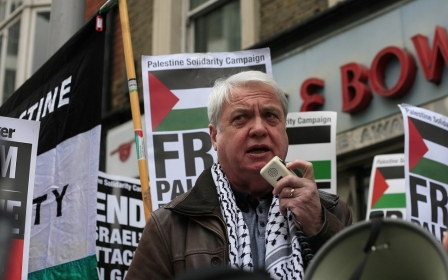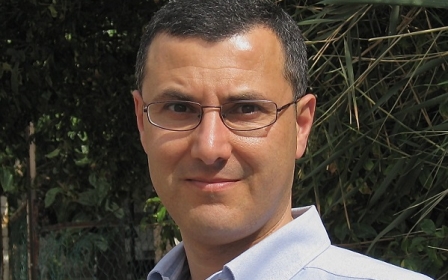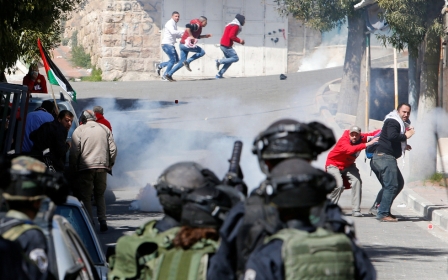Banning BDS supporters is incompatible with a Western-style democracy
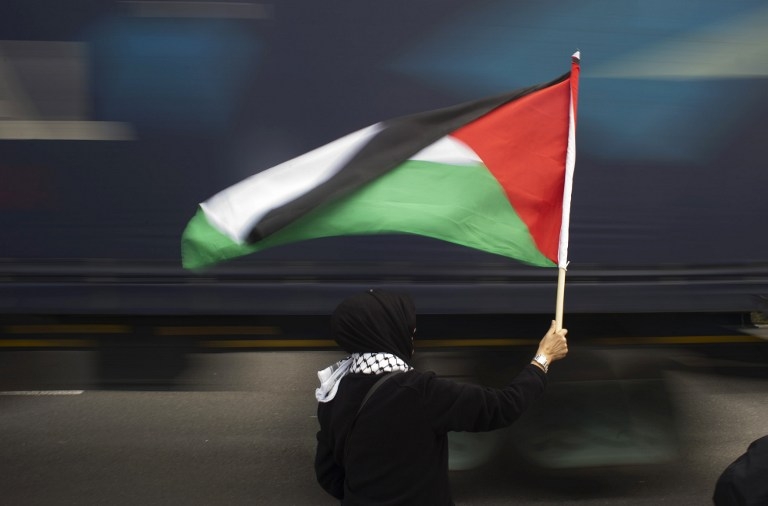
Israel’s parliament began the year with a volley of bills designed to entrench its occupation of the Palestinian territories, insult the indigenous Palestinian population and place a heavy price on anyone critical of its policies.
What is particularly galling is that to achieve this, it has used its loudly touted claim to be a Western-style democracy.
The year kicked off with the passing of the “regulation bill” on 6 February 2017, designed unashamedly to retroactively “legalise” 4,000 Jewish Israeli homes which were previously deemed illegal under Israel’s own laws.
The bill, supported by Israeli Prime Minister Benjamin Netanyahu, was condemned by human rights group Peace Now which described it as a “fatal blow to democracy” and, if passed, would “turn Israeli citizens to thieves and stain Israel’s law books”.
While Israel’s attorney general, Avichai Mandelblit, did call the law unconstitutional and while it is likely to eventually be struck down by the Israeli Supreme Court, its initial passage shows a dangerous direction of travel for Israeli democracy.
Silencing the call to prayer
On 12 February, Israeli ministers endorsed a draft bill, which would restrict the Muslim call to prayers. In the draft, the athan, the Muslim call to prayer – and an integral part of Palestinian culture and history since the siege of Jerusalem in 637 AD - was insultingly characterised as “noise pollution”.
Those initiating the bill argued that it disturbs non-Muslims – or more specifically, illegal settlers who have moved into predominantly Palestinian areas including East Jerusalem.
With the two bills and under the guise of a democracy and responding to the wishes of its citizens, Israel is using its predominantly Jewish Israeli votes in the Knesset to target Muslim history and Palestinian culture.
'Threat to the state'
The impact of the Boycott, Divestment and Sanctions (BDS) movement on Israel was downplayed by Israeli leaders until 2015, the 10th anniversary of the launch of the boycott call by Palestinian civil society.
Suddenly, it was identified as a "strategic threat to the state" and one which both Israeli leaders and supporters of Israel around the world decided to combat. In response, Netanyahu appointed Gilad Erdan as minister of public security, strategic affairs and public diplomacy, to tackle both BDS activism and Iran’s nuclear programme. Several pro-Israeli organisations and individuals gathered to find the most effective ways to quash the movement they described as seeking to delegitimise Israel and later labelled as anti-Semitic. Some $25m was allocated to their fight.
Last March, at the Yediot Achronot conference in Jerusalem, Intelligence Minister Israel Katz called for the “civil targeted killing” of BDS leaders like Omar Barghouti. Several months later, Israeli authorities imposed a travel ban on Barghouti. His residency status in Israel continues to be under threat.
With the BDS movement showing no signs of abating, Israel has since moved to pressure its allies to quash and criminalise it in their own countries. It has also worked hard to push back against rising support for the Palestinian cause and against its oppressive policies on university campuses in the West.
Some US states have moved to criminalise boycotts, such as in California and New York. France’s highest court of appeal ruled that promoters of a boycott against Israel were “guilty of inciting hate or discrimination", while a Paris Municipality recently passed anti-BDS resolutions. The UK government has specifically outlawed local authorities from using their pension policies to participate in the movement.
Banning boycotters
BDS supporters, however, have been, for the most part, free to enter Israel – to observe the situation on the ground and engage with groups promoting boycotts. But this changed on 6 March when the Knesset passed a law banning any foreign citizen who supports or promotes the boycott of Israel from entering.
In a statement after the bill passed, the parliament said: “A visa will not be granted nor a residence permit of any kind to any person who is not an Israeli citizen or permanent resident if he, or the organisation or body in which he is active, has knowingly issued a public call to boycott the state of Israel or pledged to take part in such a boycott.”
The law was quickly slammed by Jewish groups around the world including Jewish Voice for Peace, and the Anti-Defamation League (ADL). The ADL tweeted: "Israel’s democracy, pluralism, open society serve as best defense against BDS. New law harms rather than helps."
In Britain, Jewish groups including the Board of Deputies of British Jews, Jewish Leadership Council and Union of Jewish Students criticised the move, calling it “anti-democratic”, “indiscriminate” and “deeply problematic”.
The first to be banned
The first victim of the new travel ban was Hugh Lanning, chairman of the UK-based Palestine Solidarity Campaign. A longstanding human rights campaigner, Lanning was denied entry to Israel this past Sunday, less than a week after the passing of the bill.
Lanning, a frequent traveller to Israel and the Occupied Palestinian Territories, had never been barred from entry before, so it is reasonable to assume that the new law is behind his barring. Shortly after his entry was denied, Yiftah Curiel, spokesperson for the Israeli embassy in London, tweeted: “Lanning is the chairman of the PSC, an organisation that leads the campaign in the UK to demonise and boycott Israel.”
In a statement on Monday, PSC director Ben Jamal said: “By introducing this law, Israel is violating fundamental freedoms essential to a democracy - the right to free speech, to criticise government policies and human rights violations, the right to advocate non-violent actions to address human rights abuses, the right of free movement and travel. A democratic country does not behave in the way Israel is behaving.”Lanning, who is now safely back in the UK, told MEE: “What an honour - the first to be deported using the law.” He added that his questioning was “long and bizarre, mainly focused on people I had met, what I did as a chair, was I politically active?” More importantly, Lanning was “never charged with or accused of doing anything wrong on this or previous visits.”
He reiterated Jamal’s statement that: “If Israel believes that by introducing these draconian undemocratic laws it will intimidate its critics into silence it is mistaken. The PSC will not stop raising its voice to highlight the systematic violation of Palestinian human rights in Gaza, the West Bank, and Israel itself.”
Messages of support for Lanning and condemnation of the ban and his deportation have poured in, privately and over social media. Examples include trade unions PCS, UNITE and ASLEF.
Even from among Israel’s supporters, the sentiment is that this ban is a step too far. An integral part of any western-style democracy is freedom of expression. Israel’s initial objection to academic boycotts was that they restricted the opportunity to debate and criticise.
Now, by passing this law, it has closed the door itself on dialogue that could take place in Israel and the occupied territories. Not only does democracy lose, but Israel also loses support from those that gave it the benefit of the doubt as the self-proclaimed “only democracy in the Middle East". This includes support from Jews with an actual connection to Israel through family members who may now be denied entry because they support a limited boycott of goods made in illegal settlements.
The next time you hear Israel laud its democratic credentials, take it with a pinch of salt.
- Kamel Hawwash is a British-Palestinian engineering professor based at the University of Birmingham and a longstanding campaigner for justice, especially for the Palestinian people. He is vice chair of the British Palestinian Policy Council (BPPC) and a member of the Executive Committee of the Palestine Solidarity Campaign (PSC). He appears regularly in the media as commentator on Middle East issues. He runs a blog at www.kamelhawwash.com and tw
The views expressed in this article belong to the author and do not necessarily reflect the editorial policy of Middle East Eye.
Photo: A woman holds a Palestinian flag as a truck passes by, during a protest against Grammy-winning American musician Pharrell Williams near the Grand west Casino where he was holding a concert in Cape Town, on 21 September 2015 (AFP)
Middle East Eye propose une couverture et une analyse indépendantes et incomparables du Moyen-Orient, de l’Afrique du Nord et d’autres régions du monde. Pour en savoir plus sur la reprise de ce contenu et les frais qui s’appliquent, veuillez remplir ce formulaire [en anglais]. Pour en savoir plus sur MEE, cliquez ici [en anglais].



